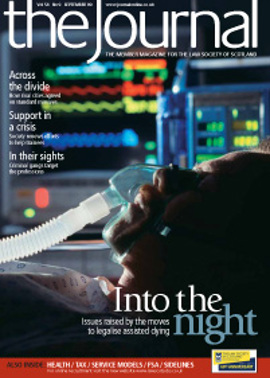Scottish Solicitors' Discipline Tribunal
Tom Hay
A complaint was made by the Council of the Law Society of Scotland against Tom Hay, solicitor, Dollar (“the respondent”). The Tribunal found the respondent guilty of professional misconduct in respect of his fabrication of three letters which he addressed to the Scottish Health Services Central Legal Office and his placing them within two files in the offices of Kerr Stirling LLP, and by doing so implying that they were genuine and that the principals had been transmitted to the addressee, which was untrue.
The Tribunal censured the respondent and directed in terms of s 53(5) of the Solicitors (Scotland) Act 1980 that any practising certificate held or to be issued to the respondent shall be subject to such restriction as will limit him to acting as a qualified assistant to (and to being supervised by) such employer or successive employers as may be approved by the Council or the Practising Certificate Committee of the Council of the Law Society of Scotland and that for an aggregate period of at least three years and thereafter until such time as he satisfies the Tribunal that he is fit to hold a full practising certificate.
The Tribunal considered that the respondent’s conduct clearly amounted to professional misconduct as he had falsified the file, which was dishonest and totally contrary to the standards expected of a solicitor. It is imperative if the public are to have confidence in the profession that solicitors must act honestly at all times. The Tribunal however took into account the fact that the respondent had fully co-operated with the Society, and had had the courage to attend and address the Tribunal and was clearly remorseful about what he had done. The Tribunal further took into account the fact that no member of the public was affected by what he had done. It also took into account the fact that the respondent had various pressures at the time of the conduct complained of, but did not consider this to be an excuse. The Tribunal noted that the respondent did not intend to work as a solicitor again, but considered that in order to ensure public protection, it was necessary to impose a restriction on the respondent’s practising certificate in addition to a censure.
Appeal under s42A:
Freelands Solicitors
An appeal was made by Freelands Solicitors, Wishaw (“the appellants”) against a finding of inadequate professional service by the Council of the Law Society of Scotland and a direction that the appellants should pay the sum of £1,300 by way of compensation to the lay complainer.
The Tribunal found that the service provided to the lay complainer by the appellants was inadequate. The Tribunal varied the determination and direction of the Society by amending the finding to failure to progress the complainer’s divorce from July 2006 after the receipt of funds (issue 1),
and failing to ensure that the lay complainer was aware that her name would remain on the mortgage over the matrimonial home until her husband was in a position to discharge the mortgage and failing to ensure that she was aware of the legal consequences of that being the position (issue 6); confirmed the determination and direction of the Society in respect of issue 2; and made no alteration with regard to the compensation awarded.
The Tribunal accepted that the divorce in this case was complicated by a number of factors. The Tribunal understood the bargaining strategy undertaken by the appellants on behalf of the lay complainer. However, from July 2006 there then appeared to be no adequate reason for the delay in obtaining signed affidavits from the lay complainer. Although the Tribunal understood the appellant’s strategy in respect of the divorce, it was clear that this was not communicated properly to the lay complainer. The Tribunal considered that the appellants’ failure to keep their client informed contributed to her lack of understanding of how long her name would be on the mortgage. The client also clearly failed to understand the implications of her name still being on the mortgage. The Tribunal however did not consider that it was in the appellants’ power to ensure that the lay complainer’s name was no longer on the mortgage, given the situation with her husband. The Tribunal accordingly varied the determination and direction of the Society in respect of this matter. In connection with the compensation, although the Tribunal varied the determination and direction of the Society, the Tribunal did not consider that this resulted in any significant change in respect of the banding of the compensation or the distress and inconvenience likely to have been occasioned, and accordingly did not interfere with the award of compensation.
In this issue
- Internet use in the workplace: a digital dilemma?
- Mental Welfare Commission for Scotland under threat
- Tricky choice over Liechtenstein assets
- Cost and benefit
- Curators: the vital link
- Solicitor advocates: the future (part 2)
- Trainee recruitment: dialogue continues
- What sort of life?
- Registers page
- Foot on the ladder
- Recovery vehicle
- Your say
- Lawyers in their sights
- West Bank: a response
- Fairness guide to success
- Facebook debate pulls them in
- Law reform update
- Ahead of the game
- Ask Ash
- A club you don't want to join
- Stress busters
- Into the ether we go!
- Breaking up is hard to do
- Definitive view
- Right that doesn't pale
- Mutu point
- Once bitten, twice shy
- Scottish Solicitors' Discipline Tribunal
- Website review
- Book reviews
- FSA starts to fight back
- For a good clause






